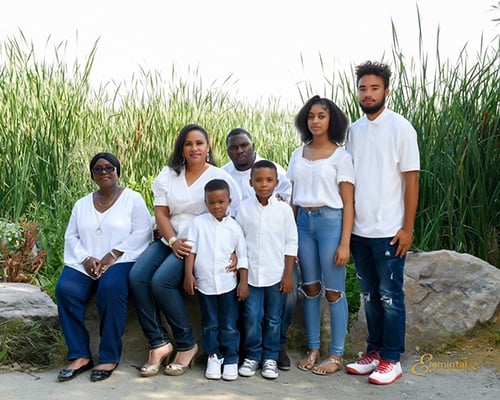War, terror, pain, death. It will change someone. It changed the course of Salwa Mourtada Bamba’s life when she was a child living with her family in Liberia, West Africa, and led her to study medicine in Colorado. In December, she will graduate from the University of Colorado College of Nursing with a Doctor of Nursing Practice degree. Everything that has come before graduation molded the immigrant into a steadfast champion for social justice.
“I remember all the challenges and the original dream I had as a child in Liberia,” said Salwa, MSN, FNP-BC, FNP-C. “When I graduate, I want to mentor other students, help their voices be heard, and give back for all of the blessings I’ve received over the years.”
Civil Unrest
Salwa was born in a country embroiled in war. When rebels fought the Liberian government, families got displaced, food and water became scarce, schools shut down, and victims piled up. During the 14-year long civil war, the United Nations set up a medical relief camp in Bamba’s neighborhood. The workers spotted the teen watching them, and asked her to help and become a triage nurse.
“I would help take care of people and give them cards for rice, food, oil, and a place to stay. Since schools were closed because of the fighting, I became a triage nurse for two years,” she said.
Danger was everywhere from the rebels. They forced boys to join at gunpoint, and girls were often kidnapped. The danger was even greater for Salwa and her sister, who were light-skinned from a Lebanese father and a Liberian mother. One day during relative peace, her sister Laila went to the market and never came home. Salwa and her family later learned Laila had been kidnapped, taken to the rebel base, and murdered.
Hearing the rebels were out for more light-skinned blood, her father begged a relative to sneak Salwa out of Liberia. Within 24 hours of her sister’s death, 14-year-old Salwa was in Ghana, placed in a boarding school. While her dad worked on plans to permanently move Salwa to America to live with her uncle, Salwa focused on graduating high school and dreamed about her future.
“I would just sit on the beach and dream about going to medical school. I would think about my classes, what my teachers would be like, and how I would use my medical education,” she said.
Coming to America
In 1998, Salwa escaped Africa to Aurora, Colorado. She went to the University of Colorado to earn a Bachelor of Nursing degree. In time, her two brothers and mother joined her in Colorado, but her father had passed away.
After facing prejudice for her skin being too light-toned in Liberia, in America, she was disregarded by some because her skin was too dark. She recalls times when medical professionals assumed the white person next to her was always the nurse, but never her. Even in school at the University of Colorado, she and other minority students say they were unfairly criticized and held to different standards because of the color of their skin.
“I’ve realized the experiences that marginalized us are not normal. We should not have been treated that way. It made me feel ‘less than’ and not good enough.”
Future Voices
It came to a head after an altercation with police led to the death of George Floyd, a Black man in Minnesota. Salwa decided to take a stand.
“George Floyd's situation and the pandemic highlighted social, racial, ethnic, and economic disparities that minority populations have dealt with for decades,” said Salwa.
Last year, she, student Omarah Macias, and other students created a support group for minorities on campus called Future Voices.
“Most students who experience discrimination are not talking about it because they don’t feel safe, and they don’t think they’re going to be heard. They just think, ‘I’m going to keep my head down, take care of my family, survive, and graduate. There’s a lot of turmoil inside,” she said. “Our goal with Future Voices is to allow a safe space for their voices to be heard where they don’t fear retaliation.”
Salwa says research shows patients do better when they are treated by a medical professional who looks like them and can advocate for them. U.S. Census Bureau statistics show that more than one-third of the populations identifies as non-white. Yet, the minority nursing population is only 19-percent.
When Salwa graduates, she will work to help other minority students enter the nursing profession. She’ll also continue to serve on the CU College of Nursing Alumni Association Board, upon which she was recently elected. She’s grateful the university is hiring a diversity coordinator to focus on the issue of diversity and equity in nursing education.
 Salwa Mourtada Bamba and her family |
As a Family Nurse Practitioner today, she cares for families and plans to educate them and be an advocate for equal access to primary care for marginalized communities. In her hometown of Liberia, she’s starting a non-profit organization in her sister’s name to help women, infants, and children with health literacy and free prenatal and well-child checks.
Salwa had a traumatic start to life, facing terror and civil unrest. Now, she deliberately chooses to walk down the road of social injustice so that those who follow will have an easier journey.



